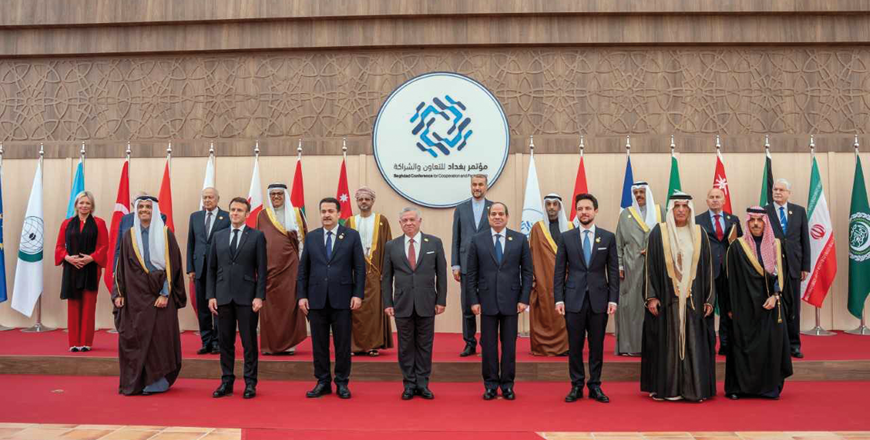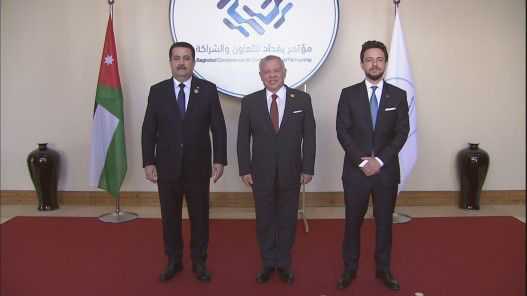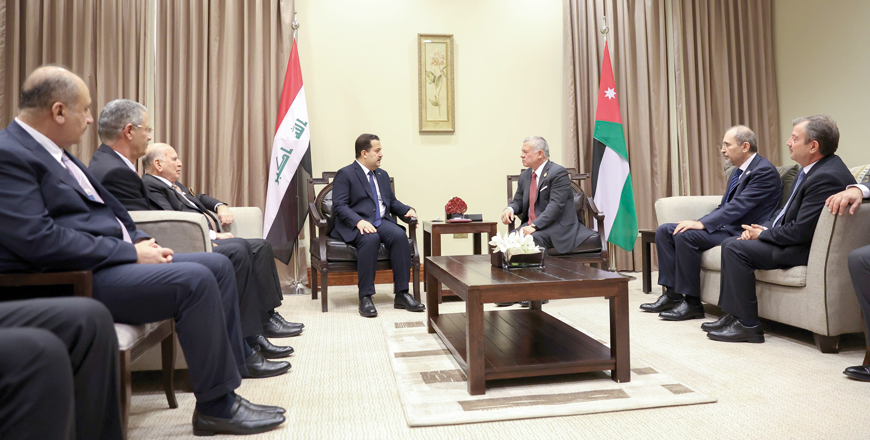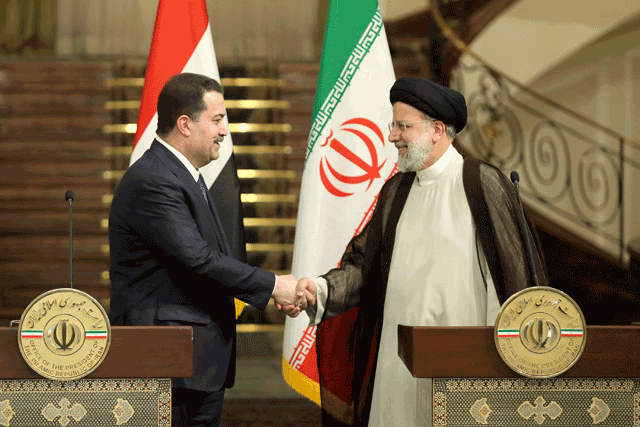You are here
Iraq stability, regional integration dominate Jordan-hosted Baghdad conference
By JT - Dec 21,2022 - Last updated at Dec 21,2022

His Majesty King Abdullah, accompanied by HRH Crown Prince Hussein, and dignitaries pose for a photo at the second Baghdad Conference for Cooperation and Partnership at the Dead Sea on Tuesday (Photo courtesy of Royal Court)
AMMAN — The establishment of the Baghdad Conference for Cooperation and Partnership stems from Iraq’s aspiration to enhance cooperation and partnership with neighbouring and friendly countries, Iraqi Prime Minister Mohamed Shia Al Sudani said on Tuesday.
Delivering a speech at the launch of the conference’s 2nd edition in the Dead Sea area, Sudani expressed hope to enhance relations in various fields, and to develop these ties to help enhance stability and development in the region, the Jordan News Agency, Petra, reported.
According to Sudani, the Iraqi government has adopted an “open approach” to building regional and international partnerships based on joint interests. This includes establishment of comprehensive strategic projects connecting Iraq with its regional surroundings, he said.
“We believe that the priority now is to strengthen cooperation and partnership among our countries through interdependence in infrastructure, economic integration and mutual investments that strengthen the bonds of brotherhood and friendship between our nations and peoples. We seek to work together to transform from consuming to producing countries,” the prime minister said.
This goal can be achieved through the establishment of joint industrial zones that can increase shared industrial capacity and link each other’s value-added chains within an integrated, competitive chain in global markets; in addition to the launch of mega-projects in various sectors, he added.
It is necessary to focus on the services sector, he noted, and to develop it as one of the most important drivers of the economy in the region. Equally, addressing unemployment through the development of the private sector, the improvement of working conditions, and the provision of guarantees to workers is important to this process, he said.
“At the domestic level, we have placed the fight against financial and administrative corruption at the centre of our priorities. We have practically started the anti-corruption campaign, starting at the highest levels, and we ask our brotherly and friendly countries to help us recover Iraq’s looted and smuggled funds and to extradite those who are residing in these countries,” Sudani said.
He noted that the Iraqi government is working hard to improve the country’s investment environment in terms of legislation, procedures and guarantees that enable investors to access Iraqi markets and take advantage of the “significant” opportunities it offers.
“We must all continue to work together and join hands to fight extremist ideology in all its forms, and develop real mechanisms and programmes to expose the malicious intentions of terrorists who recruit young people with their destructive ideas,” the prime minister said.
French President Emmanuel Macron said that Jordan plays a pivotal role in supporting dialogue and enhancing diplomacy in the region, according to Petra.
Macron said that all countries participating in the conference seek to uphold security and stability in Iraq and the entire region. Ensuring Iraq’s stability requires solving its problems with neighbours, he added.
He added that the region is turning into a centre of diplomatic gravity with an enhanced role in global stability.
Egyptian President Abdel Fattah El Sisi noted that the conference comes at a time of a “remarkable” improvement in conditions in Iraq.
The Egyptian president congratulated Iraq on completing all phases of constitutional entitlement, noting that it will open wider horizons to move forward into the future.
Sisi also praised “sacrifices and efforts of the Iraqi people” in facing and eliminating terrorism, voicing Egypt’s utter rejection towards interference in Iraqi domestic affairs, according to Petra.
Kuwaiti Prime Minister Sheikh Ahmad Nawaf Al Ahmad Al Jaber Al Sabah said that Arab countries realise Iraq’s status and importance, noting that Arab countries seek to restore the effective role of Iraq in the region.
Sheikh Ahmad also referred to the electric connection agreement with Iraq as an example of endeavours to restore Baghdad’s role.
Saudi Foreign Minister Prince Faisal Bin Farhan said that Saudi Arabia supports Iraq’s efforts to face challenges, expressing his country’s plans to activate an electric connection project with Iraq.
Saudi Arabia will not spare any effort to support Iraq’s economic development process, adding that Riyadh utterly rebukes any attacks on Iraqi territory, Prince Farhan added.
Also speaking at the conference, Bahraini Foreign Minister Abdullatif Bin Rashid Al Zayani stressed his country’s keenness to enhance international cooperation and partnership with Iraq.
He also noted the importance of preserving Iraqi security, stability, sovereignty and territorial unity in order to restore its pivotal role as an effective and positive power among Arab countries, as well as in the regional and international arenas.
Zayani also reiterated the significance of adhering to the principle of “good neighbourliness” and mutual respect as per international law, highlighting the importance of adopting a peaceful approach to settling disputes and discarding the spread of hatred, division and sectarianism.
Iranian Foreign Minister Hossein Amir-Abdollahian said that dialogue and cooperation among countries in the region is not an option, but rather a dire need. The minister stressed that Iran’s fixed policy is to avoid war and exert efforts to restore security and stability.
Since the start of its work, the new government has developed its ties with the neighbouring countries, including Iraq, he said, stressing Iran’s support for Iraq’s prosperity.
He added that the increased trade volume with the neighbouring countries and meetings with senior officials in the region, as well as holding joint economic and political committees are all evidence of Iran’s keen interest in maintaining ties in the region.
Secretary General of the Gulf Cooperation Council (GCC) Nayef Al Hajraf expressed his condolences to the Kingdom over the fallen security personnel while on duty, stressing the council’s solidarity and support to all Jordanian efforts to protect its security and stability.
Hajraf added that collective efforts to promote security and stability in the region and to promote people’s aspirations for prosperity remain at the top of concerns and priorities.
The secretary general noted that the GCC has always sought to strengthen relations with Iraq, given the firm relations based on geographical neighbourliness, religion and language, and the desire for development and collective peace.
Arab League Secretary General Ahmed Aboul Gheit, sounding the alarm on the continuation of the Palestinian-Israeli conflict, urged the international community to stop the rapid deterioration of the Palestinian situation.
The Baghdad conference comes during an important turning point in Iraq’s contemporary history, he said, noting that Baghdad, after the formation of the government, is moving towards restoring balanced relations with Arab countries and the region.
He also said that the conference serves as a platform to enhance regional cooperation, stressing that regional prosperity is tied to minimising security tensions and threats.
Addressing the gathering, Oman’s Foreign Minister Badr Busaidi expressed solidarity with Baghdad in achieving the development aspirations of Iraqis, calling to find regional and universal common ground.
EU High Representative for Foreign Affairs and Security Policy and European Commission Vice President Josep Borrell said that the first round of the conference has helped Iraq to resume its role as a guard of regional peace and security.
The EU is “a real friend” of Iraq, he said, expressing readiness to support the Iraqi efforts towards comprehensive reforms.
He also highlighted plans to hold a ministerial-level meeting to bring together the EU and Iraq during the first half of the next year.
Turkish Ambassador to Jordan Ismail Aramaz also emphasised support for Iraq’s stability and unity, expressing his country’s readiness to cooperate with the Iraqi prime minister over issues of common interest, especially addressing geographic-related matters.
Terrorism is lethal and led to economic losses, the diplomat said, calling for combating terrorist organisations and threats, and expressing confidence that the output of the conference would largely serve Iraq.
Related Articles
AMMAN — His Majesty King Abdullah on Tuesday met with Iraq Prime Minister Mohamed Shia Al Sudani and the accompanying delegation, on the sid
AMMAN — His Majesty King Abdullah on Tuesday met with Iraq Prime Minister Mohamed Shia Al Sudani and the accompanying delegation, on the sid
TEHRAN — Iran’s supreme leader Ayatollah Ali Khamenei cast doubt on Baghdad’s commitment to secure their common border during talks on Tuesd



















